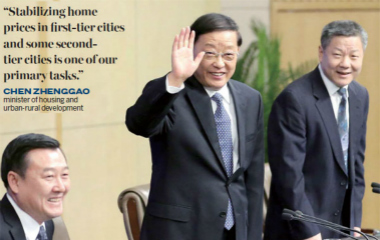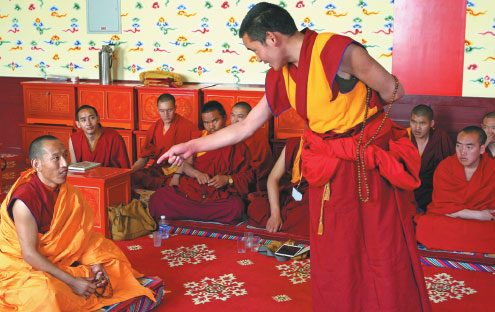Taking a new road to enlightenment
Updated: 2016-03-25 08:05
By Xu Wei(China Daily)
|
|||||||||
|
A Tho Ram Pa program student (left) during a debate with a monk from another monastery who was invited to test the candidates. Provided to China Daily |
Tibetan Buddhist monks are learning a range of skills, from languages to computing, along with their religious studies to ensure they don't lose touch with the modern world. Xu Wei reports.
Tadrin Gyatso regards the task of learning the Tibetan Buddhism canon as a lifelong mission and he values the process of self-enlightenment as highly as his inherited title of Living Buddha.
The 28-year-old native of Dege, a county in Sichuan province, was enthroned as a Living Buddha (a monk revered by his peers as the reincarnation of a spiritual leader) when he was 10, but the ceremony only marked the beginning of his journey.
"To me, the learning process is eternal. It's not just about this life, but also the next life," said the monk, who is studying the Tho Ram Pa, equal to a university doctorate, at the High-level Tibetan Buddhism College of China in Beijing.
Tadrin Gyatso, who is also abbot of a monastery that is home to more than 60 monks, studied at the Dzongsar Buddhist Academy in Dege for more than a decade before he gained admission to the college last year. He is a follower of the Sakya school, one of the four major schools of Tibetan Buddhism, along with the Nyingma, Kagyu and Gelug schools.
One of the big differences between the academies is that the college in Beijing offers non-religious courses, including Mandarin and computer studies, that will help him cope with secular issues at the monastery, he said.
Kalzang Yuknyin, the teacher in charge of student enrollment, said the college is set to welcome more students under a new five-year plan that will see student numbers rise from the current 90 to about 120 by 2017 and to 150 by 2020.
Liu Peng, vice-president of the college said that in 2012 the central government launched a project to build new campuses for seven Tibetan Buddhist colleges across the provinces of Sichuan, Qinghai, Yunnan and Gansu, and also the Tibet autonomous region.
Four colleges in Qinghai, Gansu and Tibet have already moved into their new homes, and two other campuses are still under construction, he said. Work has yet to start on the seventh campus.
"Before, the colleges had to rely on the monasteries in which they were based for classrooms and prospective students, which limited their scale and the number of students," he said.
The move is part of a national plan to develop an academic ranking system that will provide valid certificates for monks and nuns and confirm their achievements in the study of Tibetan Buddhism. The system includes the three-year Tho Ram Pa program and the two-year program for Chi Ram Pa, which is equivalent to a master's degree.
Liu said the college has explored a range of ways to award academic qualifications to monks and nuns, and the Tho Ram Pa program is offered to all schools of Tibetan Buddhism, including the Gelug, Kagyu, Nyingma, Sakya and the minority Jonang sect, as well as the Tibetan Bonpo religion. The program will be opened to monks of the Gelug school, the largest sect, every year. For the other sects, the program will be open for applications every two or three years.
In 1987, the State Council endorsed the foundation of the college after a proposal by the late 10th Panchen Lama. So far, nearly 1,000 lamas, including 93 Living Buddhas, have studied there.
Even though the college is located in the Xihuang Temple close to Beijing's bustling Third Ring Road, Tadrin Gyatso has never succumbed to the temptations of city life. "All I need is a quiet corner of the campus where I can meditate and recite the scriptures," he said.
Today's Top News
President optimistic for Sino-German cooperation
Info sharing 'is key' as Europe faces terror threat
Uneasy times as Belgium mourns the dead
Belgian bombing suspect still at large: Prosecutor
Belgian media withdraws reports of suspect's arrest
Brussels bombers were brothers El Bakraoui
Chinese citizens in Belgium get help after attack
Europe ramps up security in wake of Brussels attacks
Hot Topics
Lunar probe , China growth forecasts, Emission rules get tougher, China seen through 'colored lens', International board,
Editor's Picks

|

|

|

|

|

|







